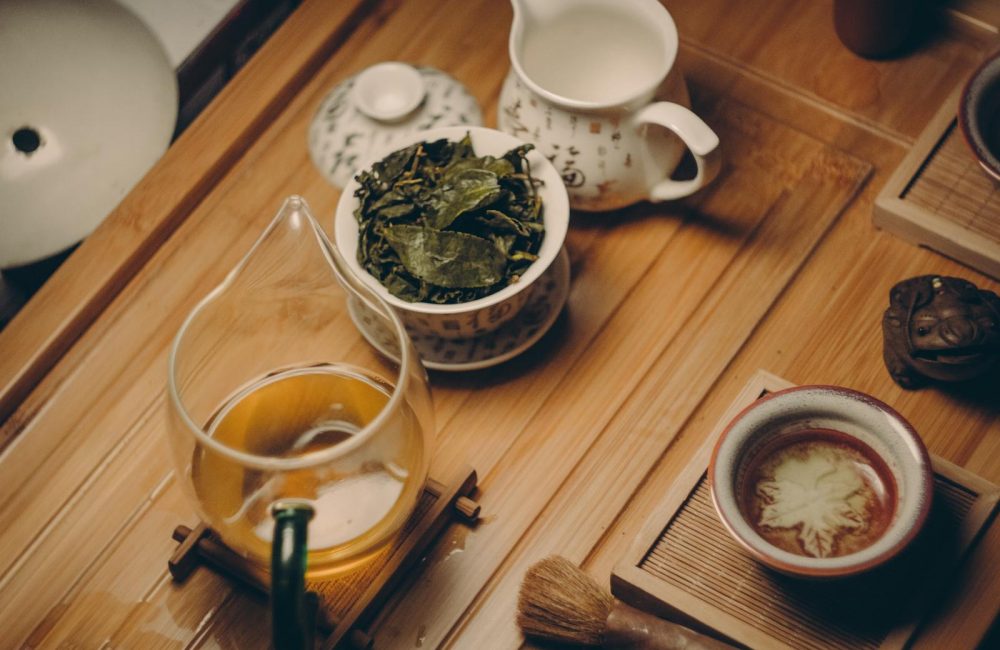Incorporating teas into your daily routine can be a soothing and natural way to support mental well-being, especially when it comes to managing depression and achieving emotional balance. Let’s delve deeper into the unique benefits each tea offers and how they can be seamlessly integrated into your life.
Chamomile Tea
Chamomile tea is celebrated for its calming properties, often used to promote relaxation and reduce anxiety. The tea is crafted from the dried flowers of the chamomile plant, which contain compounds like apigenin, known for its mild sedative effects. This helps calm the nervous system and improve overall mood.
Practical Tips for Enjoying Chamomile Tea:
- Evening Ritual: Brew a cup of chamomile tea as part of your bedtime routine. The warm, floral aroma can help signal your body that it’s time to unwind and prepare for restful sleep.
- Pairing with Lavender: Combine chamomile with lavender for an enhanced calming effect. Both herbs work synergistically to reduce stress and promote relaxation.
Personal Insight:
My grandmother used to swear by a cup of chamomile tea before bed, and after trying it myself during stressful college exams, I found it significantly helped curb my anxiety and improve my sleep quality.
Green Tea
Rich in antioxidants, green tea contains L-theanine, an amino acid that promotes relaxation without drowsiness. This unique combination of caffeine and L-theanine can boost alertness while reducing stress, making it an excellent choice for those seeking emotional balance.
How to Maximize Green Tea Benefits:
- Morning Pick-Me-Up: Start your day with a cup of green tea to energize your morning routine without the jitters associated with coffee.
- Mindful Brewing: Use slightly cooler water (about 80°C or 176°F) to avoid bitterness and preserve the delicate flavors and nutrients of the tea leaves.
Case Study:
A study conducted by the American Journal of Clinical Nutrition found that participants who consumed green tea regularly reported lower levels of stress and improved cognitive function compared to non-tea drinkers.
Holy Basil Tea
Also known as tulsi, holy basil tea is renowned for its adaptogenic properties, helping the body cope with stress and promoting overall balance. It’s revered in Ayurvedic medicine for its ability to support resilience to stress and its calming effect on the mind.
Integrating Holy Basil Tea into Your Routine:
- Stress Relief: Sip on holy basil tea during work breaks to combat midday stress and maintain focus.
- Culinary Use: Add holy basil tea to soups or broths for an extra layer of flavor and health benefits.
Real-world Application:
A friend of mine who was constantly stressed at her high-pressure job began drinking holy basil tea daily. She noticed a significant improvement in her ability to manage stress and felt more grounded throughout her workday.
Lemon Balm Tea
Traditionally used to uplift mood and reduce sadness, lemon balm tea offers calming properties that sooth the mind and promote relaxation. Compounds in lemon balm provide mild sedative effects, enhancing well-being and alleviating symptoms of anxiety and depression.
Tips for Using Lemon Balm Tea:
- Midday Break: Enjoy a cup of lemon balm tea during your lunch break to reset and recharge your mental state.
- DIY Infusion: Combine lemon balm with fresh mint leaves for a refreshing and calming iced tea.
Anecdotal Evidence:
I remember a period when I felt particularly downcast, and a friend recommended lemon balm tea. Its light citrusy flavor and calming effects quickly became a favorite part of my afternoon routine.
Lavender Tea
Lavender tea is known for its soothing effects on the mind and body, helping reduce tension and promote peace. The fragrant flowers of the lavender plant contain compounds that relax the nervous system, alleviating stress and facilitating relaxation.
Enhancing Your Lavender Tea Experience:
- Pre-Sleep Wind Down: Incorporate lavender tea into your nightly routine to help transition into a restful sleep.
- Aromatic Steam: Use the steam from your freshly brewed lavender tea as an aromatherapy treatment by inhaling deeply before drinking.
Common Mistakes & How to Avoid Them:
- Over-Brewing: Lavender can become overly bitter if steeped too long. Keep the steeping time to about 5 minutes for optimal flavor and effectiveness.
Passionflower Tea
Passionflower tea is effective in alleviating symptoms of anxiety and insomnia, often accompanying depression. It works by increasing gamma-aminobutyric acid (GABA) levels in the brain, a neurotransmitter that regulates mood and induces relaxation.
How to Incorporate Passionflower Tea:
- Evening Relaxation: Drink passionflower tea an hour before bedtime to promote restful sleep and calm the mind.
- Blending with Chamomile: Combine with chamomile for a potent sleep aid that enhances both relaxation and mood stabilization.
Expert Advice:
Herbalists often recommend passionflower tea for individuals struggling with racing thoughts and anxiety-induced insomnia due to its natural calming properties.
St. John’s Wort Tea
St. John’s Wort has been used for centuries for mental health conditions, including depression. While often taken as a supplement, its tea form can also be therapeutic, believed to increase serotonin levels, a neurotransmitter linked to mood regulation.
Important Considerations:
- Consult Healthcare Providers: Due to potential interactions with medications, consult your doctor before consuming St. John’s Wort, especially if you’re on antidepressants.
- Regular Monitoring: Keep track of any changes in mood or side effects, adjusting your tea consumption as needed.
Historical Context:
St. John’s Wort’s use dates back to ancient Greece, where it was utilized for its mood-enhancing properties. Its continued popularity speaks to its potential benefits in managing depression naturally.
Valerian Root Tea
Valerian root tea is praised for its sedative and calming effects, beneficial for those dealing with depression, particularly if accompanied by sleep disturbances. It can improve sleep quality and reduce anxiety, contributing to better emotional balance.
How to Use Valerian Root Tea:
- Pre-Bedtime Use: Drink valerian root tea about 30 minutes before bed to help promote deep, restorative sleep.
- Avoid During Daytime: Due to its sedative effects, avoid drinking valerian root tea during the day to prevent drowsiness.
Professional Insight:
Many naturopaths recommend valerian root tea to clients with chronic insomnia or anxiety, highlighting its efficacy in creating a more stable and calm mental environment.
Ashwagandha Tea
Ashwagandha is another powerful adaptogen shown to reduce stress and anxiety, often precursors or symptoms of depression. Its tea can help regulate the body’s stress response, improve resilience to stressors, and promote well-being.
Practical Advice for Ashwagandha Tea:
- Daily Routine: Incorporate ashwagandha tea into your evening routine for its stress-reducing benefits.
- Pair with Meditation: Drink ashwagandha tea before meditation sessions to enhance relaxation and focus.
Scientific Support:
Research published in the Journal of Alternative and Complementary Medicine indicates that ashwagandha can significantly lower cortisol levels, a marker of stress, in individuals experiencing chronic stress.
Rhodiola Tea
Rhodiola is known for its adaptogenic properties, helping the body adapt to and resist stress. Rhodiola tea can improve depression symptoms by enhancing mood and alleviating fatigue, particularly beneficial for stress-related depression.
Integrating Rhodiola Tea:
- Morning Brew: Start your day with rhodiola tea to boost energy levels and mental clarity throughout the day.
- Cold Brew Option: Prepare rhodiola tea as a cold brew for a refreshing drink during warmer months.
Real-Life Example:
A co-worker experiencing burnout from long hours at work began drinking rhodiola tea. She reported feeling more energized and better equipped to handle her workload within weeks.
Incorporating these teas into your daily routine offers a comforting and potentially effective way to support mental health. While herbal teas can complement other treatments for depression and emotional imbalance, consulting with healthcare professionals is crucial, especially if you’re taking medications or have specific health concerns. With the right approach, these teas can become a soothing part of your self-care regimen, helping you achieve a greater sense of emotional balance and well-being.






